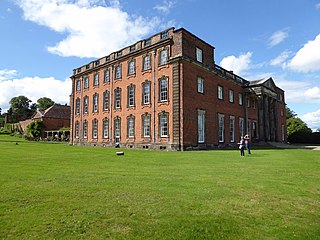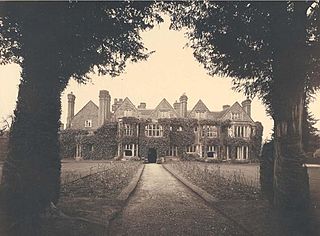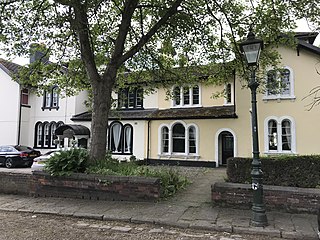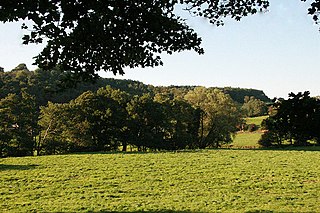
Boscobel House is a Grade II* listed building in the parish of Boscobel in Shropshire. It has been, at various times, a farmhouse, a hunting lodge, and a holiday home; but it is most famous for its role in the escape of Charles II after the Battle of Worcester in 1651. Today it is managed by English Heritage.

Chillington Hall is a Georgian country house near Brewood, Staffordshire, England, four miles northwest of Wolverhampton. It is the residence of the Giffard family. The Grade I listed house was designed by Francis Smith in 1724 and John Soane in 1785. The park and lake were landscaped by Capability Brown.

Maer Hall is a large Grade II listed 17th-century country house in Maer, Staffordshire, set in a park which is listed Grade II in Historic England's Register of Parks and Gardens

Okeover Hall is a privately owned Grade II* listed country house in Okeover, Staffordshire, England. It is the family seat of the Okeover family, who have been in residence since the reign of William Rufus. The house lies close to the border between Staffordshire and Derbyshire, which lies on the far side of the small River Dove. The Hall is not open to the public.

The Moat House is a Grade II* building in Tamworth, Staffordshire, England, in what were once the grounds of Tamworth Castle. The summer house, in the rear beer garden, is a Grade II listed building.

Exton Hall is an English country house on the western edge of the village of Exton, Rutland, England, standing in its own extensive park, and is the country seat of the Earls of Gainsborough.

Wroxall Abbey is a substantial Victorian mansion house situated at Wroxall, Warwickshire which was converted for use as a hotel, spa, wedding venue and conference centre. It is a Grade II listed building.

Hoar Cross Hall is a 19th-century country mansion near the villages of Hoar Cross and Hamstall Ridware, Staffordshire. England. The Grade II listed building is operated as a hotel and spa, and has facilities for conferences and weddings.

Whittington Old Hall is a 16th-century mansion house at Whittington, Staffordshire, England, which has been subdivided into separate residential apartments. It is a Grade II* listed building.

Stretton Hall is an early 18th-century mansion house at Stretton, South Staffordshire. It is the home of a branch of the Monckton family descended from John Monckton 1st Viscount Galway. It is a privately owned Grade II* listed building, not open to the public.

Walton Hall is a 16th-century country mansion at Walton, near Wellesbourne, Warwickshire, once owned by Lord Field and the entertainer Danny La Rue, now in use as a hotel which is now part of Accor Hotels. It is a Grade II* listed building.

The Villas, Stoke-on-Trent, is an estate of 24 Victorian houses in Stoke-upon-Trent, England. Originally a distinct settlement set in green fields, it now merges with the late 19th- and early 20th-century suburban sprawl along London Road below Penkhull village on the outskirts of Stoke-on-Trent and within the ward of Stoke and Trent Vale.

Aqualate Hall, a 20th-century country house, is located in Forton, Staffordshire, England, some 2 miles (3.2 km) east of the market town of Newport, Shropshire and 10 miles (16 km) west of the county town of Stafford. It is a Grade II* listed building.

Heighley Castle is a ruined medieval castle near Madeley, Staffordshire. The castle was completed by the Audley family in 1233 and for over 300 years was one of their ancestral homes. It was held for Charles I during the English Civil War and was destroyed by Parliamentary forces in the 1640s. The ruinous remains comprise masonry fragments, mostly overgrown by vegetation. The site is protected by Grade II listed building status and is a Scheduled Ancient Monument. The castle is privately owned and is not open to visitors.

Hawkstone Hall is a 43,400 square feet (4,030 m2) early 18th-century country mansion near Hodnet and Weston-under-Redcastle, Shropshire, England which was more recently occupied as the pastoral centre of a religious organisation for many years. It is a Grade I listed building.

Moseley Hall is a Grade II listed 18th-century country house which was situated in parkland in Moseley, Birmingham. The hall itself is now part of Moseley Hall Hospital and much of the surrounding estate has been developed for roads and housing.
Checkley cum Wrinehill is a former civil parish in Cheshire East, England. It contained three buildings that are recorded in the National Heritage List for England as designated listed buildings. Of these, one is listed at Grade II*, the middle grade, and the other two are at Grade II. The parish was entirely rural, and the listed buildings consist of a country house, its gate piers, and a cottage.

Madeley Court is a 16th-century country house in Madeley, Shropshire, England which was originally built as a grange to the medieval Wenlock Priory. It has since been restored as a hotel.
Madeley is a town and a civil parish in the district of Telford and Wrekin, Shropshire, England. It contains 54 listed buildings that are recorded in the National Heritage List for England. Of these, one is listed at Grade I, the highest of the three grades, seven are at Grade II*, the middle grade, and the others are at Grade II, the lowest grade. Most of the listed buildings are grouped in or near the town centre, and these include houses and cottages, the earliest being timber framed, two larger houses with associated structures, churches, a presbytery, a school, and a war memorial. To the north of the town centre is Madeley Court, now a hotel, which is listed together with associated structures. Outside the town centre are more listed houses, two public houses, and former industrial structures, including an inclined plane, a bridge, and the remains of a brickworks and an ironworks, the latter two forming part of the museum at Blists Hill Victorian Town.
Madeley is a civil parish in the district of Newcastle-under-Lyme, Staffordshire, England. It contains 38 listed buildings that are recorded in the National Heritage List for England. Of these, one is listed at Grade I, the highest of the three grades, one is at Grade II*, the middle grade, and the others are at Grade II, the lowest grade. The parish contains the villages of Madeley and Onneley and the surrounding countryside. Most of the listed buildings are houses and associated structures, cottages, farmhouses and farm buildings. The other listed buildings include a church, monuments in the churchyard, the remains of a castle and a manor house, almshouses, a drinking fountain, mileposts, a school, a war memorial, and a telephone kiosk.

















